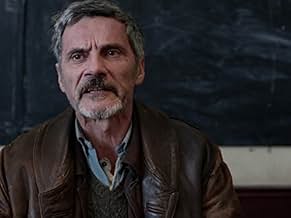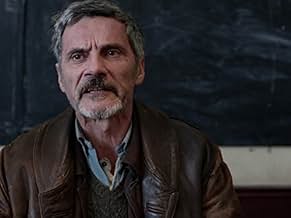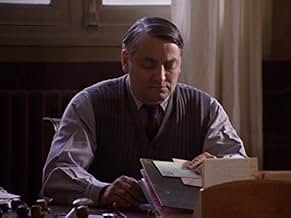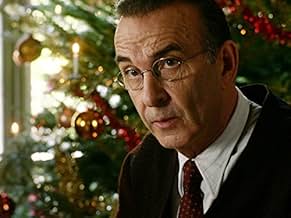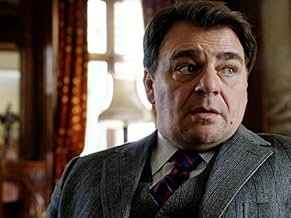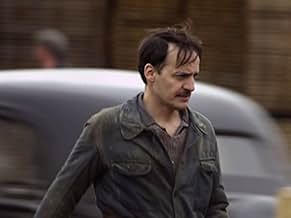Ripercorre le esperienze di vari abitanti di un piccolo villaggio immaginario appena all'interno della zona di occupazione durante la seconda guerra mondiale.Ripercorre le esperienze di vari abitanti di un piccolo villaggio immaginario appena all'interno della zona di occupazione durante la seconda guerra mondiale.Ripercorre le esperienze di vari abitanti di un piccolo villaggio immaginario appena all'interno della zona di occupazione durante la seconda guerra mondiale.
- Premi
- 2 vittorie e 10 candidature totali
Sfoglia gli episodi
Recensioni in evidenza
10cochet
This TV show describes the life of ordinary people in a small town of rural France during the German occupation in WWII. It is extremely well documented, cleverly written and very well played. The great plus of this series is that it meticulously analyzes the mechanisms which brought some people to collaborate with the Germans and others to resist, without judging, without falling into easy generalizations. The treatment of the small communist cell's actions is particularly spot on. I highly recommend this show to anyone interested in WWII, and anyone who wants to understand life during a war, and how good people can come to serve a fascist regime.
This is a truly remarkable, riveting, and even addictive TV series, certainly one of the best I have ever seen, regardless of language. (I'm 64. I've seen a lot of TV series.) What makes it remarkable? The acting is uniformly first-rate, the direction very good, the script even better than first-rate. Each episode holds you from the get-go, and many end with cliff-hangers that make you want to start the next episode. As I said, it is downright addicting.
Are there any flaws? I don't know that I would call them flaws, but I can see that those interested in the history of the Occupation in France could have several issues with the series.
1) A previous reviewer wrote that it is an "Excellent TV show explaining the life of ordinary people in Nazi occupied France." Not really true. The main French characters are almost all members of the haute bourgeoisie: a leading doctor, a factory manager, the chief of police, etc. They do not deal with the issues that friends of mine remember from the Occupation: the shortage of everything, starting with food and fuel to heat homes. For ordinary French people, the Occupation was four years of waiting in line every day for bare necessities, punctuated by an occasional dramatic event. That wouldn't make for good TV drama, though, so this series has made the dramatic more "common" than it evidently was in the life of the average French person. The episodes almost all focus on dramatic events. It makes for riveting viewing, certainly, but it gives a skewed view of daily life during the Occupation.
2) Much of the focus is on sex and marital infidelity, rather than issues specific to the Occupation. (It reminds me a lot of Zola's Germninal in that sense.) This holds audiences, certainly, but there is nothing particularly related to the Occupation here. Almost all the wives turn out to be unfaithful to their husbands. I'm not sure how a feminist would react to that, or indeed many French women, faithful to their husbands or boyfriends, who lived through the era.
3) The depiction of the Communist Party leaders is uniformly negative. Again, the focus seems to be very bourgeois, very much Gaulliste. I noticed, for example, that when others, even Gaullistes like Bériot, refer to the Communists as Bolsheviks, that just gets translated as Communist. There is, of course, a big difference there. It is very true that many non-Communists feared the Communist Resistance and feared that their goal was to lead France into another class war/revolution, but that was not in fact the goal of all the FTP/Communist resistants.
All that said, I repeat that this is a riveting series. You will not regret watching it - except that you may well become addicted to it.
-----------------
I have now watched through the end of Season 6, which is as far as the American distribution has gone as of January 2017. (Season 7 is announced for mid-February.) All I have to add to what I wrote above is that this series does a remarkable job of making all the lead characters, no matter what their political position, very human and very three-dimensional. No one is all bad, and virtually no one is all good. That becomes very problematic for me in the case of the Militiamen and some of the Germans, the SS and the Gestapo. I don't like feeling sympathy or compassion for individuals who have committed monstrous crimes, as some of these characters do. Nevertheless, I will concede that even someone who can shoot two little children in cold blood - that is a VERY difficult scene to watch - might also have human qualities. I don't like conceding that, but I will.
The end of episode 12 of Season 6 turned my blood cold. It focused on some of the worst events of the Liberation, and made it anything but a joyous event. I know, having interviewed people who lived in a small town in France at that time, that what is described did indeed take place across France. Some of it is even toned down, like the shearing of the women accused of collaboration with the Germans. Still, it is a particularly somber note on which to end the penultimate season.
Are there any flaws? I don't know that I would call them flaws, but I can see that those interested in the history of the Occupation in France could have several issues with the series.
1) A previous reviewer wrote that it is an "Excellent TV show explaining the life of ordinary people in Nazi occupied France." Not really true. The main French characters are almost all members of the haute bourgeoisie: a leading doctor, a factory manager, the chief of police, etc. They do not deal with the issues that friends of mine remember from the Occupation: the shortage of everything, starting with food and fuel to heat homes. For ordinary French people, the Occupation was four years of waiting in line every day for bare necessities, punctuated by an occasional dramatic event. That wouldn't make for good TV drama, though, so this series has made the dramatic more "common" than it evidently was in the life of the average French person. The episodes almost all focus on dramatic events. It makes for riveting viewing, certainly, but it gives a skewed view of daily life during the Occupation.
2) Much of the focus is on sex and marital infidelity, rather than issues specific to the Occupation. (It reminds me a lot of Zola's Germninal in that sense.) This holds audiences, certainly, but there is nothing particularly related to the Occupation here. Almost all the wives turn out to be unfaithful to their husbands. I'm not sure how a feminist would react to that, or indeed many French women, faithful to their husbands or boyfriends, who lived through the era.
3) The depiction of the Communist Party leaders is uniformly negative. Again, the focus seems to be very bourgeois, very much Gaulliste. I noticed, for example, that when others, even Gaullistes like Bériot, refer to the Communists as Bolsheviks, that just gets translated as Communist. There is, of course, a big difference there. It is very true that many non-Communists feared the Communist Resistance and feared that their goal was to lead France into another class war/revolution, but that was not in fact the goal of all the FTP/Communist resistants.
All that said, I repeat that this is a riveting series. You will not regret watching it - except that you may well become addicted to it.
-----------------
I have now watched through the end of Season 6, which is as far as the American distribution has gone as of January 2017. (Season 7 is announced for mid-February.) All I have to add to what I wrote above is that this series does a remarkable job of making all the lead characters, no matter what their political position, very human and very three-dimensional. No one is all bad, and virtually no one is all good. That becomes very problematic for me in the case of the Militiamen and some of the Germans, the SS and the Gestapo. I don't like feeling sympathy or compassion for individuals who have committed monstrous crimes, as some of these characters do. Nevertheless, I will concede that even someone who can shoot two little children in cold blood - that is a VERY difficult scene to watch - might also have human qualities. I don't like conceding that, but I will.
The end of episode 12 of Season 6 turned my blood cold. It focused on some of the worst events of the Liberation, and made it anything but a joyous event. I know, having interviewed people who lived in a small town in France at that time, that what is described did indeed take place across France. Some of it is even toned down, like the shearing of the women accused of collaboration with the Germans. Still, it is a particularly somber note on which to end the penultimate season.
This is the Most extraordinary show I've ever seen in my 60 year life. The depth and evolution of the characters is flawless. The pain and guilt of the occupation is palpable and touched me in ways I never anticipated. While the show was wrenching at times to watch, I can't imagine a better rendition of such a painful and revelatory experience.
I can't recommend enough!
Postscript: Since finishing the series and writing this review, I've been searching for one word to describe the experience of Un Village Français....The word is haunting...
I can't recommend enough!
Postscript: Since finishing the series and writing this review, I've been searching for one word to describe the experience of Un Village Français....The word is haunting...
Un village français is a seven season revelation. Though it appears to be a story about people, it's really an allegorical tale about a nation. Each character represents a segment of the population that either lived through or was directly affected by the German occupation of France from 1940 through 1944. The hapless, the hopeless, the connivers, the accommodators, the victims and even those who embraced the NAZI ideology are all here in human form. As their story unfolds we learn...in vary nuanced lessons...that huge forces that rip away all that moors society and each of us to each other can't be summed up in a phrase or a song. That there's devastation, pain, denial, guilt and even redemption awaiting all of us when evil becomes authority. Other reviewers will tell you the story. But in truth Un village français is much more. And so well done that it might be the best thing ever to appear on the small screen. Watch it.
I wasn't sure about watching this series but I was really hooked by Episode 3 of the first season. However, a couple of my favorite French stars, Thierry Godard and Audrey Fleurot, drew me to the series. It was well worth it. I just completed the last season and have since purchased the entire series. I have never done that before.
The story behind the citizens of the town is intriguing all through their lives and to the final episodes as I watched them decline in health and appearance. It is a fascinating story of the Occupation and how the war affected these citizens of an obscure French village. Viewers were introduced to the harsh reality of war in France if you watched "Band of Brothers" but this shows the sorrow, death and troubling decisions citizens had to make as the war and occupation moved on.
I recommend this to all viewers. Yes, it takes a lot of time to watch it but it is worth it.
The story behind the citizens of the town is intriguing all through their lives and to the final episodes as I watched them decline in health and appearance. It is a fascinating story of the Occupation and how the war affected these citizens of an obscure French village. Viewers were introduced to the harsh reality of war in France if you watched "Band of Brothers" but this shows the sorrow, death and troubling decisions citizens had to make as the war and occupation moved on.
I recommend this to all viewers. Yes, it takes a lot of time to watch it but it is worth it.
Lo sapevi?
- QuizThe town depicted in the series, Villeneuve, is fictional.
- BlooperIn a first-season episode set during 1940, a German soldier is shown wearing the Close Combat Clasp, a decoration which first began to be awarded in November, 1942.
- ConnessioniReferenced in Séries express: Episodio #2.30 (2009)
I più visti
Accedi per valutare e creare un elenco di titoli salvati per ottenere consigli personalizzati
Dettagli
- Data di uscita
- Paese di origine
- Sito ufficiale
- Lingua
- Celebre anche come
- A French Village
- Aziende produttrici
- Vedi altri crediti dell’azienda su IMDbPro
- Tempo di esecuzione
- 52min
- Colore
- Proporzioni
- 1.78 : 1
Contribuisci a questa pagina
Suggerisci una modifica o aggiungi i contenuti mancanti

![Guarda Bande-annonce Saison 1 [OV]](https://m.media-amazon.com/images/M/MV5BYjJkN2E2M2QtNjgyZS00NTVjLThlYzMtNjBlM2QxZTMxODMwXkEyXkFqcGdeQXRodW1ibmFpbC1pbml0aWFsaXplcg@@._V1_QL75_UX500_CR0)
